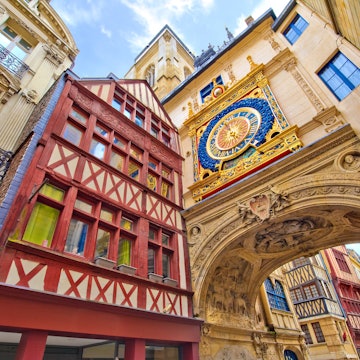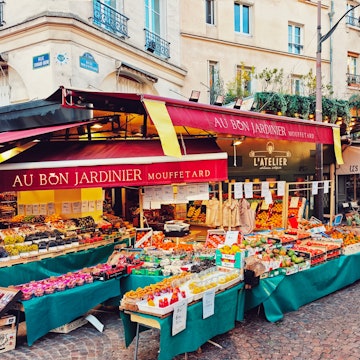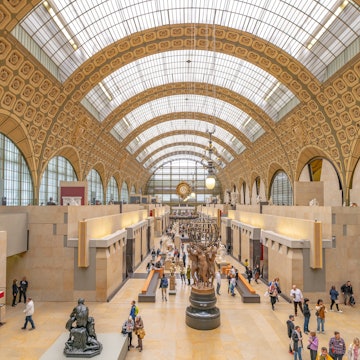

The Islamic Museum of Art was one of I.M. Pei's last designs.
Internationally-renown modernist architect, I.M. Pei, designed some of the world’s most recognizable buildings. From his iconic addition to the Louvre in Paris, France to the Rock and Roll Hall of Fame in Cleveland, Ohio, his work brought a sculptural element to the skylines of many cities. Pei used arrangements of simple geometric shapes, triangles, circles and squares to honor the time, place and purpose of whatever he was commissioned to create.
Here is our list of the best places around the globe to see examples of Pei’s stunning work.

Louvre Pyramid
Nearly as dazzling as the cherished collection in the Louvre, the Grand Pyramide is a 21m-high glass pyramid that serves as the main entrance to the museum. Shimmering sunbeams filter through the 673 glass-panes as art-lovers are guided effectively through a subterranean network in order to ascend into the museum’s main buildings.
Commissioned among major controversy, including Pei not being sufficiently French, and the worry that the modernist-design did not honor the French Renaissance style of the Louvre, the pyramid remains a much debated but iconic example of Pei’s style.

Sūzhōu Museum
Featuring a fascinating collection of ancient Chineses art, this museum is one of Pei’s most recent designs built in his home-town Sūzhōu, China. As such, Pei took inspiration from a traditional Sūzhōu garden and its confluence of water, bamboo and straight lines to create a building that both honors the past and creates a new path for the future.
Don’t wear flip flops when you visit the museum and be sure to take note of its surroundings. It is adjacent to the Humble Administrator’s Garden, the largest of Sūzhōu’s gardens. Often considered to be the most impressive garden, it is also the most crowded. Visit early in the morning before heading to the museum.

Miho Museum
In Shiga Prefecture, Japan the Miho Museum is accessed via a footpath and a long pedestrian tunnel Pei had drilled through a mountain that opens onto a gorge. It feels like a secret hideout in a futuristic farmhouse and the view is stunning to say the least. Pei came to call this particular building Shangri-La, because of its seamless harmony with the natural landscape. The design also pays homage to the ornate temples in neighboring Kyoto.
While the collection originally included mostly rare antique Japanese tea ceremony utensils, Pei encouraged collector Mihoko Koyama to expand her collection. He was making adjustments to the design of the building even during construction to accommodate new additions.

Museum of Islamic Art
The exceedingly impressive Museum of Islamic Art in Doha, Qatar houses the largest collection of Islamic art in the world. Pei’s design has the museum rising from its own purpose-built island and set in an extensive landscape of lawns and ornamental trees. The building itself is a masterpiece of light and space, drawing your eyes up to the dome, a clever modern take on an element so prevalent in Islamic architecture.
The collection is vast, so pace yourself by enjoying the splendid views across the water, the cafe downstairs or the top-floor IDAM restaurant, which just happens to be one of Doha’s best.

Rock and Roll Hall of Fame & Museum
Who wouldn’t be inspired by generations worth of the best music to rock your socks off? Pei initially turned down the invitation to design the Rock and Roll Hall of Fame because he preferred Jazz to Rock and Roll, however, after changing his mind, he spent a week traveling with Jann Wenner the then-publisher of Rolling Stone, to Memphis and New Orleans to explore the links between Rock and Jazz.
The result was impressive. Pei’s design is meant to celebrate the youthful energy and rebellion that Rock exemplifies. Wings burst from the pyramid of the main building while a cantilevered theater hangs over Lake Erie. It is a stunning place to explore your favorite musical giants.

Other amazing buildings designed by I.M. Pei
This is not, by any means, and exhaustive list. Check out these other amazing examples of Pei’s modernist vision if you happen to be traveling near.
National Gallery of Art: East Building - Washington D.C.
Luce Memorial Chapel - Taichung, Taiwan
Mudam - Luxembourg City, Luxembourg
John F Kennedy Presidential Library & Museum - Boston, Massachusetts
Morton H Meyerson Symphony Center - Dallas, Texas
https://shop.lonelyplanet.com/products/amazing-architecture-a-spotters-guide-1?via=Z2lkOi8vbG9uZWx5LXBsYW5ldC9Xb3JrYXJlYTo6Q2F0YWxvZzo6Q2F0ZWdvcnkvNTllZTQ5YzNmOTJlYTE0MTg2MDU4ODI3
Take your France trip with Lonely Planet Journeys
Time to book that trip to France
Lonely Planet Journeys takes you there with fully customizable trips to top destinations–all crafted by our local experts.

























